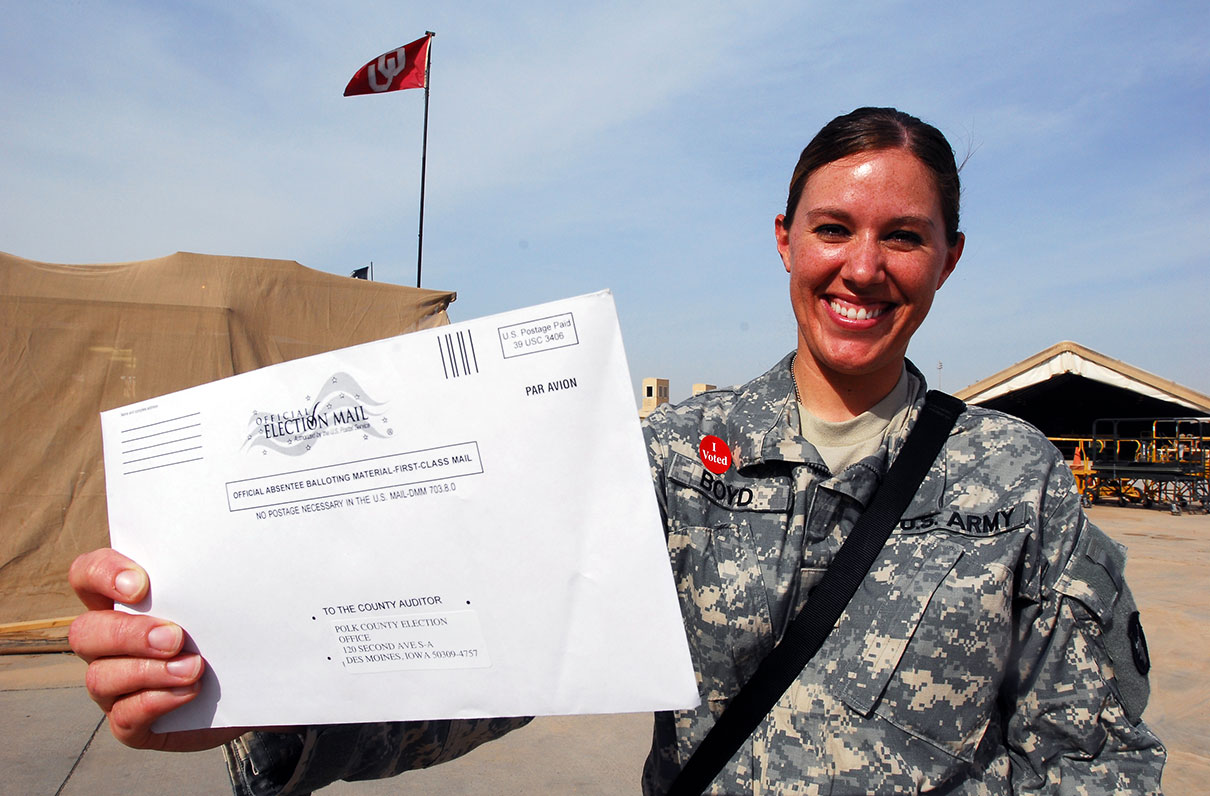[Editor's Note: On Oct. 30, 2018, the MOAA Military Family Initiative (MMFI) formally changed its name to the MOAA Foundation (TMF).]
A new survey of nearly 3,000 active-duty servicemembers, veterans and others in the military community showed higher levels of election participation than their civilian counterparts and confidence in the absentee voting process, but a wide engagement gap between active-duty members and their spouses.
Only about 27 percent of military spouses who responded to the survey - “Military Families Voting: Perceptions, Challenges, and Barriers to Voting Participation and Absentee Voting,” a partnership between MOAA, Syracuse University's Institute for Veterans and Military Families (IVMF), and the Democracy Fund - reported feeling encouraged to vote, compared with 70 percent of active-duty respondents.
[RELATED: Download the Report]
Some who were encouraged may not have known the next step: Nearly 1 in 5 active-duty spouses (19.2 percent) who responded said the main reason they didn't vote in the 2016 election was because they didn't know how to get an absentee ballot.
The findings will help shape voter engagement efforts by MOAA for the 2018 election, with a focus on family involvement as well as ballot request and deadline information.
Voting assistance officers or other resource providers sometimes will “share information with a servicemember expecting them to share it with their spouse,” said Amanda Bainton, executive director of MOAA MFI. “And that's not always happening.”
MOAA MFI will adapt and enhance the absentee-voting materials it put out in 2016 using the results of the survey and encourage military voters to participate in November's vote, Bainton said. The materials supplement and explain information available via the Federal Voting Assistance Program (FVAP), including ballot deadlines and details on requesting a Federal Write-in Absentee Ballot.
Only about 68 percent of spouses of active-duty servicemembers who responded to the survey said they'd received or requested an absentee ballot, compared with 84.7 percent of active-duty members.
Col. Mike Turner, USAF (Ret), MOAA's vice president of development, said the survey - which evolved from MOAA's 2016 voter outreach program - revealed the need to focus specifically on the active-duty spouse community in future absentee voting information efforts.
“We wanted to find out what needed to be addressed and what misperceptions existed among the active-duty community about the absentee voting process,” Turner said. “Our prior research partnership with IVMF addressing spouse employment indicated the active-duty spouse community is largely underserved, and we believe the voting survey data indicates they face some challenges with absentee voting as well.”
The need to better understand issues with the military voting process also drew IVMF to the project, said Nick Armstrong, the organization's senior director for research and evaluation.
“The IVMF is pleased to collaborate with MOAA on a topic so foundational as voting,” Armstrong said. “Understanding potential barriers and views on the absentee voting process can help inform strategies promoting greater awareness and access to the ballot box which in turn, only helps to further the democratic process for all Americans.”
Stacey Scholl, senior program associate for the election program at the Democracy Fund, said that military families “face distinct challenges when it comes to participating in our democracy, and the Military Family Absentee Voting Survey provides us with critical insights to help work to improve all Americans' voting experience.”
“It is a privilege for Democracy Fund to support the effort of MOAA MFI and Syracuse University to protect the rights of those who serve and sacrifice for us,” Scholl added. “As a country, we can do more to close existing knowledge gaps for this community. Incorporating these learnings into future efforts to help them navigate the voting process is the next step.”
Voting totals and more
More than 9 in 10 of those surveyed said they generally voted in presidential elections (93.1 percent), compared with 85.9 percent in congressional elections and 80.1 percent in statewide races. A U.S. Census Bureau survey showed 61.4 percent of the eligible overall population voted in the 2016 presidential race.
Those who voted absentee largely reported a successful voting experience: 89.5 percent of respondents said they'd received the ballot with enough time to return it prior to deadline, and less than 12 percent of respondents reported being dissatisfied or very dissatisfied with the entire process.
More from the survey:
- About 3 in 4 active-duty service members (76.4 percent) and their spouses (76.5 percent) stated the most important aspect of using an absentee ballot in future elections was voting convenience, and 50.6 percent ranked voting security as the second most important aspect. “This finding suggests military family absentee voters would favor some form of online registration and voting even at a somewhat higher risk to ballot security,” Turner said.
- Respondents were split on how they'd prefer to return a ballot, with 46 percent favoring an as-yet-unavailable electronic submission process and 45.5 percent preferring regular mail. Veterans backed the mail-in option (54.5 percent in favor), while active-duty servicemembers preferred going digital (57.1 percent in favor).
- Less than half of respondents (46.1 percent) either agreed or strongly agreed there was foreign interference in the 2016 presidential election, while 23.5 percent either disagreed or strongly disagreed that foreigners interfered. By comparison, 60 percent of the general population who responded to a July Ipsos poll said they believed Russia had interfered; 18 percent said they hadn't, and another 22 percent said they didn't know.
- While respondents showed confidence in their ballots, 72.6 percent of survey respondents said they didn't get notification that their vote had been counted. A similar percentage said they did not check their ballot's status; 65.1 percent of active-duty servicemembers and 68.6 percent of their spouses said they weren't aware the status could be checked.

